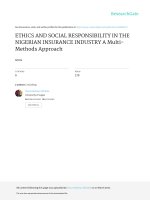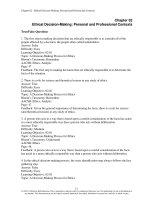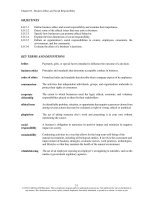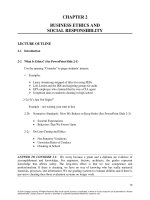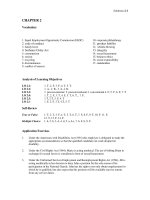(Tiểu Luận) Subject Business Ethics And Social Responsibility Final Group Assignments Do You Agree With The Policy Why Or Why Not.pdf
Bạn đang xem bản rút gọn của tài liệu. Xem và tải ngay bản đầy đủ của tài liệu tại đây (199.54 KB, 10 trang )
UNIVERSITY OF FINANCE – MARKETING
Subject: BUSINESS ETHICS AND SOCIAL RESPONSIBILITY FINAL GROUP
ASSIGNMENTS
Subject Code: 2231910006301
Lecturer: Tô Anh Thơ
Members’ name
Members’ code
Huỳnh Hiểu Bội
2021001323
Nguyễn Thị Kim Chi
2021001334
Nguyễn Thị Hồng Nhung
2021006373
c
Table of content
Table of content ...................................................................................................................... ii
Question 1 ....................................................................................................................................... 1
Question 2 ....................................................................................................................................... 2
Question 3 ....................................................................................................................................... 4
Question 4 ....................................................................................................................................... 4
ii
c
(Tieu.luan).subject.business.ethics.and.social.responsibility.final.group.assignments..do.you.agree.with.the.policy.why.or.why.not(Tieu.luan).subject.business.ethics.and.social.responsibility.final.group.assignments..do.you.agree.with.the.policy.why.or.why.not(Tieu.luan).subject.business.ethics.and.social.responsibility.final.group.assignments..do.you.agree.with.the.policy.why.or.why.not(Tieu.luan).subject.business.ethics.and.social.responsibility.final.group.assignments..do.you.agree.with.the.policy.why.or.why.not
Question 1
Do you agree with the policy? Why or why not?
In my opinion, I agree with the company's policy, because every working environment has its own
policy and the policy that the company sets is to create fairness and equality for all. In business, it
is necessary to have a clear public and private discernment, it is impossible for personal gain to
contravene your own ethics and the policies that the company has set. In case, if Mr. Hung knows
that the company's policies are such that he still receives them, it will have a negative impact on
the image of the company, and if a business does not have a certain policy, the company will not
be able to ensure a healthy working environment for all employees of his company. For the benefit
of everyone and the whole business, even if the gift is expensive, I will not accept it and will also
choose words to say no to avoid offending Mr. Hung. As I know, business ethics is that fairness
always comes first, and I also want to keep long-term partnerships with other partners. If other
partners know that I received the gift from Mr. Hung, they will no longer have the confidence to
continue cooperating with the company. or the other partners all do like Mr. Hung, the company's
policy set at first will no longer work, and from there all employees will also start accepting bribes
with the wrong purpose, leading to the development and operation of the company more and more.
Accepting bribes is essentially misconduct, bribery of power, and violation of law and morality,
especially for the person receiving bribes.
-
According to Article 354 of the 2015 Penal Code, amended in 2017, accepting a bribe is the
act of a person with a direct or intermediate position, authority to receive with any benefit to
himself or herself or to another organizer to do or not for the benefit or at the request of the
person giving the bribe.
-
According to Article 364 of the 2015 Penal Code, amended in 2017, giving a bribe is the act
of a person directly or through an intermediary who has given or will give to a person with a
position, or power, or another person or organization with any benefit to the person holding
the position, the power to do or not to comply with the request of the person giving the bribe.
In addition, according to Article 2 of the Law on Anti-Corruption 2018, giving and receiving bribes
is one of the corrupt acts.
1
c
(Tieu.luan).subject.business.ethics.and.social.responsibility.final.group.assignments..do.you.agree.with.the.policy.why.or.why.not(Tieu.luan).subject.business.ethics.and.social.responsibility.final.group.assignments..do.you.agree.with.the.policy.why.or.why.not(Tieu.luan).subject.business.ethics.and.social.responsibility.final.group.assignments..do.you.agree.with.the.policy.why.or.why.not(Tieu.luan).subject.business.ethics.and.social.responsibility.final.group.assignments..do.you.agree.with.the.policy.why.or.why.not
(Tieu.luan).subject.business.ethics.and.social.responsibility.final.group.assignments..do.you.agree.with.the.policy.why.or.why.not(Tieu.luan).subject.business.ethics.and.social.responsibility.final.group.assignments..do.you.agree.with.the.policy.why.or.why.not(Tieu.luan).subject.business.ethics.and.social.responsibility.final.group.assignments..do.you.agree.with.the.policy.why.or.why.not(Tieu.luan).subject.business.ethics.and.social.responsibility.final.group.assignments..do.you.agree.with.the.policy.why.or.why.not
As a business entity, I know that integrity is a business behavior that is consistent with a genuine
business purpose (for my own benefit and the whole community), creating a good character for
myself. For employees in companies and businesses, integrity helps them to be dedicated, and
loyal to the company and business, complete the job well, unite with each other, contribute to
sustainable business development, and improve the lives and profits of business owners.
Sacrificing personal interests to maintain discipline and purity.
When a person's personal interests collide in any manner with the interests of the business, this is
referred to as a “conflict of interest”. A conflict situation can arise when an employee takes action
or has interests that may make it difficult to perform his or her company work objectively and
effectively. The receipt of improper personal benefits by an employee or a member of their family
(such as personal loans, services, or payment for services that the person is performing in the
course of company business) as a result of his or her position in the company or gains personal
enrichment through access to confidential information. Despite one's best attempts to avoid them,
conflicts of interest can occur in many common circumstances. Employees are encouraged to seek
clarification of and discuss questions about, potential conflicts of interest with someone in the
Company’s Legal Department. Any employee who becomes aware of a conflict or potential
conflict should bring it to the attention of a supervisor, manager, or other appropriate persons
within the Company.
Consequently, in my point of view, I agree with the company policy.
Question 2
Would it be against corporate policy to accept such a gift? Give your explanation.
Self-interest is the characteristic that only knows personal interests and wants to take advantage of
other people's interests for their own work. Another aspect is called selfishness, that is, knowing
only oneself and not caring about the interests and pursuits of others.
Self-interest, in terms of individuals, is that a person only cares about what he or she will gain or
lose in life, in relation to people around. They often have a psychology of exploration, evaluation,
fear, and weighing every glass before considering doing something.
Since self-interest is the engine of action, it tends to induce bad behavior, which, if perpetuated by
the majority of people in a country, makes people in that country worse off. should be separated
2
c
(Tieu.luan).subject.business.ethics.and.social.responsibility.final.group.assignments..do.you.agree.with.the.policy.why.or.why.not(Tieu.luan).subject.business.ethics.and.social.responsibility.final.group.assignments..do.you.agree.with.the.policy.why.or.why.not(Tieu.luan).subject.business.ethics.and.social.responsibility.final.group.assignments..do.you.agree.with.the.policy.why.or.why.not(Tieu.luan).subject.business.ethics.and.social.responsibility.final.group.assignments..do.you.agree.with.the.policy.why.or.why.not
(Tieu.luan).subject.business.ethics.and.social.responsibility.final.group.assignments..do.you.agree.with.the.policy.why.or.why.not(Tieu.luan).subject.business.ethics.and.social.responsibility.final.group.assignments..do.you.agree.with.the.policy.why.or.why.not(Tieu.luan).subject.business.ethics.and.social.responsibility.final.group.assignments..do.you.agree.with.the.policy.why.or.why.not(Tieu.luan).subject.business.ethics.and.social.responsibility.final.group.assignments..do.you.agree.with.the.policy.why.or.why.not
from each other, easily suspicious of each other, jealous, calculating and even doing evil to harm
each other.
If I agree to accept a gift from Mr. Hung to my wife, I have already violated the company's policy,
and if I refuse to accept it, I will comply with the company's policy. I am the manager of a large
production company and I think the decision not to accept gifts from Mr. Hung was the right
decision, both to keep the image of my company and to set an example for other employees. My
own morals and image cannot be exchanged for a set of jewels, if I were a bad and selfish person,
I would not be able to lead and run such a large company, and there is no reason for me to accept
my wife's gift, for as a leader, I am not so lacking in conditions that I cannot give my own wife a
set of jewelry and agree to receive a gift from Mr. Hung.
Suppose that Mr. Hung is a shopper, his actions and thoughts are derived from his own economic
interests, both have the mentality of wanting to buy cheap and well served. This mentality is no
different from the "buy cheap, sell expensive" mentality of entrepreneurs, so it is also necessary to
have the orientation of business ethics, avoiding the situation that customers take advantage of the
"God" position to infringe on the honor and dignity of entrepreneurs, eroding moral standards.
The behavior of enterprises not only stops at the proper implementation of legal documents but
must aim for a sense of responsibility. When accepting the legitimacy of trade secrets, businesses
also need to realize that sincerity, uprightness, honesty, keeping promises, and transparency not
only contribute to building their reputation and stability, but they also contribute to the ease and
efficiency of corporate transactions. Thus, the principle of integrity not only ensures businesses to
survive and develop sustainably but also contributes to the development of international trade.
Receiving a gift from a partner is not wrong, because it shows the affection and respect of the giver
for the recipient. However, in some cases, if the gift is too luxurious and the context of the gift is
not suitable for the recipient, I will still refuse in the most delicate way so as not to hurt the partner
but still maintain the cooperation between the parties.
Bribery is essentially a purchase of power, a violation of law and morality, especially on the part
of the bribe recipient. The recipient of a bribe must definitely be someone who holds power and
has "sold" that power for his own illicit gain.
3
c
(Tieu.luan).subject.business.ethics.and.social.responsibility.final.group.assignments..do.you.agree.with.the.policy.why.or.why.not(Tieu.luan).subject.business.ethics.and.social.responsibility.final.group.assignments..do.you.agree.with.the.policy.why.or.why.not(Tieu.luan).subject.business.ethics.and.social.responsibility.final.group.assignments..do.you.agree.with.the.policy.why.or.why.not(Tieu.luan).subject.business.ethics.and.social.responsibility.final.group.assignments..do.you.agree.with.the.policy.why.or.why.not
(Tieu.luan).subject.business.ethics.and.social.responsibility.final.group.assignments..do.you.agree.with.the.policy.why.or.why.not(Tieu.luan).subject.business.ethics.and.social.responsibility.final.group.assignments..do.you.agree.with.the.policy.why.or.why.not(Tieu.luan).subject.business.ethics.and.social.responsibility.final.group.assignments..do.you.agree.with.the.policy.why.or.why.not(Tieu.luan).subject.business.ethics.and.social.responsibility.final.group.assignments..do.you.agree.with.the.policy.why.or.why.not
In essence, this is an act of "exchange" between the two parties interests, based on the theory of
reasonable exchange behavior, it is explained that these relationships develop for the purpose of
bringing mutual benefits between the two parties. The greater the benefit-generating system, the
stronger and more frequent the interaction. And it becomes the desired expectation from both sides.
Thus, in the future, they will be repeated into habits, systems, and clear standards that form social
patterns, a phenomenon.
Model of action based on cooperation and exchange. This person voluntarily gives something that
he thinks may not be needed or is not as important as what he can get in return, and he values what
he gives. The exchange is more beneficial to the other party than what the other party uses in return.
The process of conducting exchanges is based on negotiation, agreement, and for mutual benefits,
selfish personal interests from both sides. But under the multi-dimensional impact when the social
network is spread out and covers the individual, it is no longer just an ordinary, public negotiation
process between two parties. In other words, it is modified and modified or implied by this act of
exchange. It is the act of giving Tet gifts for the purpose of bribery.
On the other hand, if the gift is not as valuable as flowers, pens, etc. then I think I can take it
because it shows the partner's appreciation for me, if I don't receive it, it can cause a lot of
satisfaction with the partner. So, if the gift is of little value, I'll take it.
Accordingly, in my point of view, I only agree to accept the gift when our company really has
important and special parties, then I am willing to accept the gift given by Mr. Hung but on the
condition that I will receive it openly and transparently on the presence of everyone in the company,
rather than a personal dining session between my wife and Mr. Hung.
Question 3
Put yourself in the position of Mr. Hung. Is his conduct is unethical? Why or why not?
To answer the above question, we share two cases:
Case 1: This is an informal dinner party, and the wife is not invited to the champagne reception,
nor is she presented with a high-quality diamond-studded piece of gold jewelry.
This is an understandable and acceptable case because this can be considered as one of the
activities to increase the building and bonding of the cooperative relationship between the two
parties as a representative of cooperation between the two sides of the company.
4
c
(Tieu.luan).subject.business.ethics.and.social.responsibility.final.group.assignments..do.you.agree.with.the.policy.why.or.why.not(Tieu.luan).subject.business.ethics.and.social.responsibility.final.group.assignments..do.you.agree.with.the.policy.why.or.why.not(Tieu.luan).subject.business.ethics.and.social.responsibility.final.group.assignments..do.you.agree.with.the.policy.why.or.why.not(Tieu.luan).subject.business.ethics.and.social.responsibility.final.group.assignments..do.you.agree.with.the.policy.why.or.why.not
(Tieu.luan).subject.business.ethics.and.social.responsibility.final.group.assignments..do.you.agree.with.the.policy.why.or.why.not(Tieu.luan).subject.business.ethics.and.social.responsibility.final.group.assignments..do.you.agree.with.the.policy.why.or.why.not(Tieu.luan).subject.business.ethics.and.social.responsibility.final.group.assignments..do.you.agree.with.the.policy.why.or.why.not(Tieu.luan).subject.business.ethics.and.social.responsibility.final.group.assignments..do.you.agree.with.the.policy.why.or.why.not
Case 2: A private supper followed by a personal meeting in which the wife participates. (Mr.
Hung invited his wife to open the champagne and presented her with a high-quality diamondstudded gold jewelry set.)
This is an unreasonable action because the manager and his wife, meeting privately with Mr. Hung,
they did not meet as company representatives, but as individuals, not serving the interests of the
company but serving personal interests, not based on the interests of the company for the two
parties to develop cooperation. Inviting a wife to a champagne-opening program at the restaurant
will make the wife feel that she is included in the decision-making process. That feeling is
enhanced when the wife receives a high-quality diamond-studded set of gold jewelry that makes
her feel that she is valuable. At the same time, giving a gift of high value (diamond-studded set of
gold jewelry) is not a matter of being a company partner.
This can be called “conflicts of interest”. When a person's private interests clash in any manner
with the interests of the Company, it is said to be in a "conflict of interest." A conflict situation can
arise when an employee takes action or has interests that may make it difficult to perform his or
her Company work objectively and effectively. Conflicts of interest also occur when an employee
or a member of their family receives improper personal benefits as a result of their position with
the company (such as personal loans, services, or payment for services they provide while
conducting company business) or enriches themselves personally through access to sensitive
information. Despite one's best attempts to avoid them, conflicts of interest can occur in many
common circumstances. Employees are advised to speak with a member of the company's legal
department if they have any questions or concerns regarding potential conflicts of interest. Any
employee who becomes aware of a conflict or potential conflict should bring it to the attention of
a supervisor, manager, or other appropriate persons within the Company.
This leads to the two expected responses:
Reaction 1: The wife will be surprised by the present (She doesn’t expect to receive that high
value gift) => There will be many self-questionings appearing in her head (i.e., Why Mr. Hung
sent me this high-quality diamond-studded gold jewelry set? May I deserve it or not? Could I
receive this high value thing? I’m the manager’s wife, so maybe I can accept it, etc. This highquality diamond-studded gold jewelry set absolutely suits me, etc.) => Therefore, going through
these above thoughts, the wife's person is progressively raised by gradually accepting the present
5
c
(Tieu.luan).subject.business.ethics.and.social.responsibility.final.group.assignments..do.you.agree.with.the.policy.why.or.why.not(Tieu.luan).subject.business.ethics.and.social.responsibility.final.group.assignments..do.you.agree.with.the.policy.why.or.why.not(Tieu.luan).subject.business.ethics.and.social.responsibility.final.group.assignments..do.you.agree.with.the.policy.why.or.why.not(Tieu.luan).subject.business.ethics.and.social.responsibility.final.group.assignments..do.you.agree.with.the.policy.why.or.why.not
(Tieu.luan).subject.business.ethics.and.social.responsibility.final.group.assignments..do.you.agree.with.the.policy.why.or.why.not(Tieu.luan).subject.business.ethics.and.social.responsibility.final.group.assignments..do.you.agree.with.the.policy.why.or.why.not(Tieu.luan).subject.business.ethics.and.social.responsibility.final.group.assignments..do.you.agree.with.the.policy.why.or.why.not(Tieu.luan).subject.business.ethics.and.social.responsibility.final.group.assignments..do.you.agree.with.the.policy.why.or.why.not
situation through inference, responding to dubious questions based on the desire to own a highvalue gift and feeling self-worth. Through her “psychological ownership”, the wife thinks that
accepting diamonds is normal for someone as precious as her.
“Psychological ownership” is that state where an individual feels as though the target of ownership
or a piece of that target is ‘theirs’ (i.e., it is MINE!). The construct described by this concept is
elaborated, highlighting a number of distinctive characteristics. First, the meaning and feeling
linked with "MY," "MINE," and "OUR" are examples of how the idea of ownership presents itself.
What do I believe is mine? is answered by psychological ownership. and its conceptual foundation
is a sense of ownership (Wilpert, 1991) toward a specific object (e.g., one's labor's fruits, toys,
one's house, one's land, close friends).
Reaction 2: The wife will be surprised by the present (She doesn’t expect to receive that high
value gift) => There will be many self-questionings appearing in her head (Why he gave me this
high-quality diamond-studded gold jewelry set? Is it okay to receive this kind of gift? Why am I
feeling so confused and doubting when I got it? It is unethical if I receive this high-quality
diamond-studded gold jewelry set? This action was not normal for my husband and Mr. Hung’s
current partnership, etc.) => Therefore, going through the questioning questions that she asked
herself and reflecting on the situation with the moral perspective she had, the wife feels that she is
psychologically forced.
According to psychology, psychological forces are a group of thoughts, emotions, and behavioral
developments leading to maturity. As we grow up, we accrue experience, and we understand the
world is more complex. This force encompasses choices, personality traits, and learning. If she
chooses to receive diamonds, it means that the cooperation between Mr. Hung and his husband is
more powerful than Mr. Hung. If she chooses not to accept the diamond, the cooperation
relationship between Mr. Hung and her husband will be affected
Therefore, these two reactions of the wife will make an effect on the psychology of the manager.
In conclusion, in my point of view, the act of Mr. Hung is unethical because of the reasons above.
Question 4
Imagine that you are the president and CEO. It means that you are both the largest owner and
decision-maker for business activities. Would it be unethical to accept this gift? Why or why not?
6
c
(Tieu.luan).subject.business.ethics.and.social.responsibility.final.group.assignments..do.you.agree.with.the.policy.why.or.why.not(Tieu.luan).subject.business.ethics.and.social.responsibility.final.group.assignments..do.you.agree.with.the.policy.why.or.why.not(Tieu.luan).subject.business.ethics.and.social.responsibility.final.group.assignments..do.you.agree.with.the.policy.why.or.why.not(Tieu.luan).subject.business.ethics.and.social.responsibility.final.group.assignments..do.you.agree.with.the.policy.why.or.why.not
(Tieu.luan).subject.business.ethics.and.social.responsibility.final.group.assignments..do.you.agree.with.the.policy.why.or.why.not(Tieu.luan).subject.business.ethics.and.social.responsibility.final.group.assignments..do.you.agree.with.the.policy.why.or.why.not(Tieu.luan).subject.business.ethics.and.social.responsibility.final.group.assignments..do.you.agree.with.the.policy.why.or.why.not(Tieu.luan).subject.business.ethics.and.social.responsibility.final.group.assignments..do.you.agree.with.the.policy.why.or.why.not
It would not be unethical to accept this gift. Accepting this gift does not directly affect the interests
of the company and my integrity. When a person holds a high position in a company, his value
and personal image have been raised to a higher level. Therefore, receiving a high-value gift does
not affect personal moral values. Instead of that, this gift represents the wish for a strong
cooperative relationship between the company and the supplier.
Besides, when I hold a high position, there are many factors and aspects that I must concern about
to protect the interests and benefits of the company as well as my interests and benefits. Hence,
receiving the gift will not have a big direct effect on the decision-making process as well as the
operation of the company. This gift will be an assurance that the supplier will be on the company’s
cooperation consideration list. If that partner is eligible, a contract will be signed.
However, only getting gifts from suppliers will create bad rumors, which will negatively impact
the company’s image, and personal image as well. Because every industry is a small community,
information or happenings are exchanged in these communities, also known as word of mouth.
The power of word-of-mouth may influence many relationships now, and in the future as well.
Moreover, the company’s reputation could have been influenced by the exaggerated of all media
coverage surrounding it since the news has been spread widely in society.
The purpose of corporate gifts and entertainment is to foster goodwill and productive working
relationships between business partners. An issue would arise if (1) the receipt of a gift or
entertainment by one of the employees would compromise, or could reasonably be viewed as
compromising, that person's capacity to make impartial business decisions on behalf of the
Company, or (2) the offering of a gift or entertainment by one of the employees seems to be an
attempt to obtain business through dishonest means or use dishonest means to gain any special
advantage in our business relationships. Individual employees are responsible for exercising sound
judgment and ensuring that these standards are not broken.
To prevent this situation, I will organize a solemn thankful ceremony for all suppliers that have
partnerships with the company at the end of the year. During the ceremony, these attendants will
have gifts (medals, short trips, etc.) for a strong, successful connection and to welcome an
auspicious year. With loyal and long-term suppliers of the company, the company will have
policies such as having meals between the two parties to help strengthen and increase cooperation
relations, giving gifts on Tet holidays, etc.
7
c
(Tieu.luan).subject.business.ethics.and.social.responsibility.final.group.assignments..do.you.agree.with.the.policy.why.or.why.not(Tieu.luan).subject.business.ethics.and.social.responsibility.final.group.assignments..do.you.agree.with.the.policy.why.or.why.not(Tieu.luan).subject.business.ethics.and.social.responsibility.final.group.assignments..do.you.agree.with.the.policy.why.or.why.not(Tieu.luan).subject.business.ethics.and.social.responsibility.final.group.assignments..do.you.agree.with.the.policy.why.or.why.not
(Tieu.luan).subject.business.ethics.and.social.responsibility.final.group.assignments..do.you.agree.with.the.policy.why.or.why.not(Tieu.luan).subject.business.ethics.and.social.responsibility.final.group.assignments..do.you.agree.with.the.policy.why.or.why.not(Tieu.luan).subject.business.ethics.and.social.responsibility.final.group.assignments..do.you.agree.with.the.policy.why.or.why.not(Tieu.luan).subject.business.ethics.and.social.responsibility.final.group.assignments..do.you.agree.with.the.policy.why.or.why.not
(Tieu.luan).subject.business.ethics.and.social.responsibility.final.group.assignments..do.you.agree.with.the.policy.why.or.why.not(Tieu.luan).subject.business.ethics.and.social.responsibility.final.group.assignments..do.you.agree.with.the.policy.why.or.why.not(Tieu.luan).subject.business.ethics.and.social.responsibility.final.group.assignments..do.you.agree.with.the.policy.why.or.why.not(Tieu.luan).subject.business.ethics.and.social.responsibility.final.group.assignments..do.you.agree.with.the.policy.why.or.why.not
